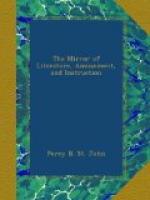To exhibit the poet in the social circle, as well as to introduce a very piquant portrait, drawn by a friend, we subjoin a leaf or two from Leigh Hunt’s Lord Byron and some of his Contemporaries[5]—displaying all the graphic ease for which Mr. Hunt is almost without a rival:—
[5] We are aware of part of
the subsequent extract having appeared
in
vol. xi. of THE MIRROR, but the additional interest
which it
bears
in juxtaposition with this Memoir, induces us to repeat
it
here.
I forget how I became acquainted with Mr. Hill, proprietor of the Monthly Mirror; but at his house at Sydenham I used to meet his editor, Mr. Dubois, Mr. Campbell, who was his neighbour, and the two Smiths, authors of The Rejected Addresses. Once or twice I saw also Mr. Theodore Hook, and Mr. Matthews, the comedian. Our host (and I thought him no older the other day than he was then) was a jovial bachelor, plump and rosy as an abbot: and no abbot could have presided over a more festive Sunday. The wine flowed merrily and long; the discourse kept pace with it; and next morning, in returning to town, we felt ourselves very thirsty. A pump by the road side, with a plash round it, was a bewitching sight.
“They who know Mr. Campbell only as the author of Gertrude of Wyoming and the Pleasures of Hope, would not suspect him to be a merry companion, overflowing with humour and anecdote, and any thing but fastidious. These Scotch poets have always something in reserve: it is the only point in which the major part of them resemble their countrymen. The mistaken character which the lady formed of Thomson from his Seasons is well known. He let part of the secret out in his Castle of Indolence; and the more he let out, the more honour he did to the simplicity and cordiality of the poet’s nature, though not always to the elegance of it. Allan Ramsay knew his friends Gay and Somerville as well in their writings, as he did when he came to be personally acquainted with them; but Allan, who had bustled up from a barber’s shop into a bookseller’s, was ‘a cunning shaver;’ and nobody would have guessed the author of the Gentle Shepherd to be penurious. Let none suppose that any insinuation to that effect is intended against Mr. Campbell: he is one of the few men whom I could at any time walk half-a-dozen miles through the snow to spend an afternoon with; and I could no more do this with a penurious man than I could with a sulky one. I know but of one fault he has, besides an extreme cautiousness in his writings; and that one is national, a matter of words, and amply overpaid by a stream of conversation, lively, piquant, and liberal—not the less interesting for occasionally betraying an intimacy with pain, and for a high and somewhat strained tone of voice, like a man speaking with suspended breath, and in the habit of subduing his feelings. No man, I should guess, feels more kindly towards his




